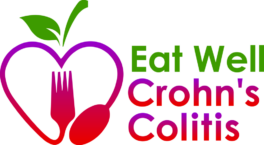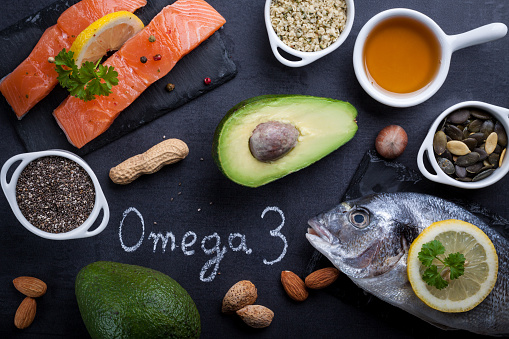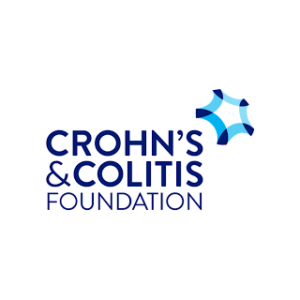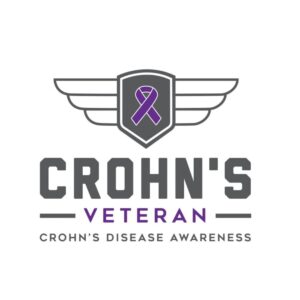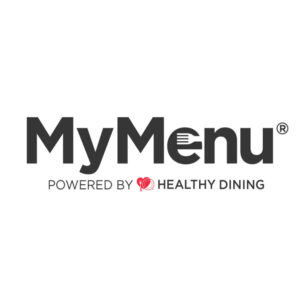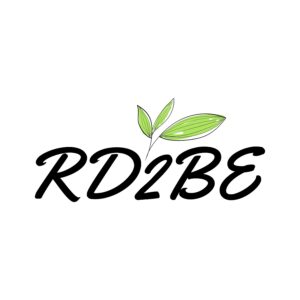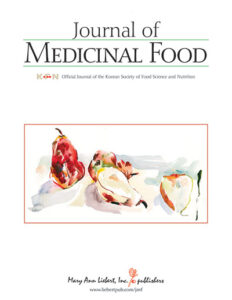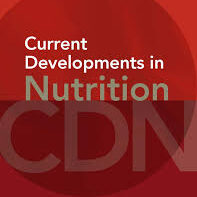Crohn’s Disease & Dietary Fiber: Fiber Intake Recommendations
Danielle Gaffen, MS, RDN, LD
- Last Updated
Co-written by Renata Cauchon-Robles
Are you wondering whether you should be eating a high or low fiber diet? Crohn’s disease dietary fiber recommendations can be especially complicated to understand. Depending on if you are experiencing a flare or any strictures, Crohn’s disease fiber intake can vary. This article will break down what you need to know about fiber and Crohn’s disease.
To start, what is fiber? Fiber is the part of plants that don’t get fully broken down by our digestive system when we eat them. So dietary fiber is fiber from foods we eat, such as fruits, vegetables, or grains. Even though fiber is not digestible, it still has a purpose! It is known for its role in helping give shape to stools and move them through the intestines.
As an IBD dietitian, I frequently address the complexities of dietary fiber intake with my clients. This subject is one I approach with both professional insight and personal empathy, especially given my husband’s experience with Crohn’s disease.
Each case of Crohn’s is unique, and dietary needs can significantly change based on an individual’s condition. The right fiber intake can be a game-changer in managing Crohn’s disease, helping patients navigate this condition with greater confidence and control.
In my practice, strategic planning for fiber consumption is tailored to each phase of the disease. During a flare, the priority is to formulate a short-term plan that eases symptoms and facilitates intestinal healing. This involves careful consideration of the total amount of fiber, the types of fiber, and their textures, depending on the individual’s current state.
Conversely, during periods of remission, my focus shifts to a long-term strategy aimed at sustaining wellness. A balanced diet, often with a higher fiber content, can maintain digestive health and prolong symptom-free periods.
This dual-phased approach ensures that dietary management is personalized and adapts to the changing needs of those living with Crohn’s disease.
Does Fiber Help Crohn’s Disease?
Fiber helps increase the diversity of the bacteria in your gut which can help prevent flare ups. A large meta-analysis study in 2023 found fiber to be helpful even when people weren’t seeking other Crohn’s related treatments.
Another long-term study found that fiber had a noticeable impact on decreasing the risk for Crohn’s disease. The benefit was strongest with fiber from fruits, and when Crohn’s disease impacted the ileum, the final long stretch of the small intestine.
When Fiber Can Make Things Worse
It’s important to know that there are times to be careful with fiber and Crohn’s. An intestinal obstruction or blockage can be worsened by extra fiber. During a blockage, insoluble fiber could increase the damage to the intestinal tissue.
If there are narrowing sections of your intestines, called strictures, a lower-fiber diet could help prevent those blockages. It is important to talk to your IBD healthcare team about how much fiber you should get every day from your meals and snacks. It’s all a delicate balance!
Is High Fiber Good for Crohn’s Disease?
Overall, there is limited research available about how a diet that is high in fiber affects Crohn’s disease. Some studies have found that a fiber-rich diet can support remission. Remission is when inflammation calms down and puts a pause on the strain to your intestines. Eating a diet rich in fiber can help make Crohn’s remission last longer when combined with IBD medication or other surgical treatments. In this case, it is important that fiber intake be managed by your healthcare team.
What Food is Considered High Fiber?
For adults, a food is considered high fiber if one serving of it contains 5-6 grams (g) or more of fiber. Here are some examples:
- 1 cup of carrots has about 5g of fiber
- ½ cup avocado has about 5g fiber
- 1 cup of cooked spinach has around 4g of fiber
The Best Fiber for Crohn’s Disease
Try a Lower Fiber Diet
During a flare, trying a lower fiber diet may help manage uncomfortable symptoms in the short-term. Basically, eating less fiber can help decrease how much stool your body makes. This helps give your gut a break when it’s inflamed and needs to focus on healing. Low fiber diets can range from 8-13 grams of fiber across the whole day.
Focus on Soluble Fiber
Help keep your stools soft by having most of your fiber intake be from foods that are higher in soluble fiber. Soluble fiber is higher in fruits and oats and can help maintain a healthy bacterial environment in your gut.
Modify Food Textures
Changing the texture of your food can help make the fiber easier to tolerate. For example, blending, pureeing or precooking fibrous foods. Removing thick peels and skins from fruits and vegetables will decrease the amount of insoluble fiber, too.
Stay Hydrated
Remember that for your body to use fiber, it needs fluids. So, remember to drink plenty of water to keep your bowels moving and avoid bloating. This is especially important if you are increasing the amount of fiber in your diet.
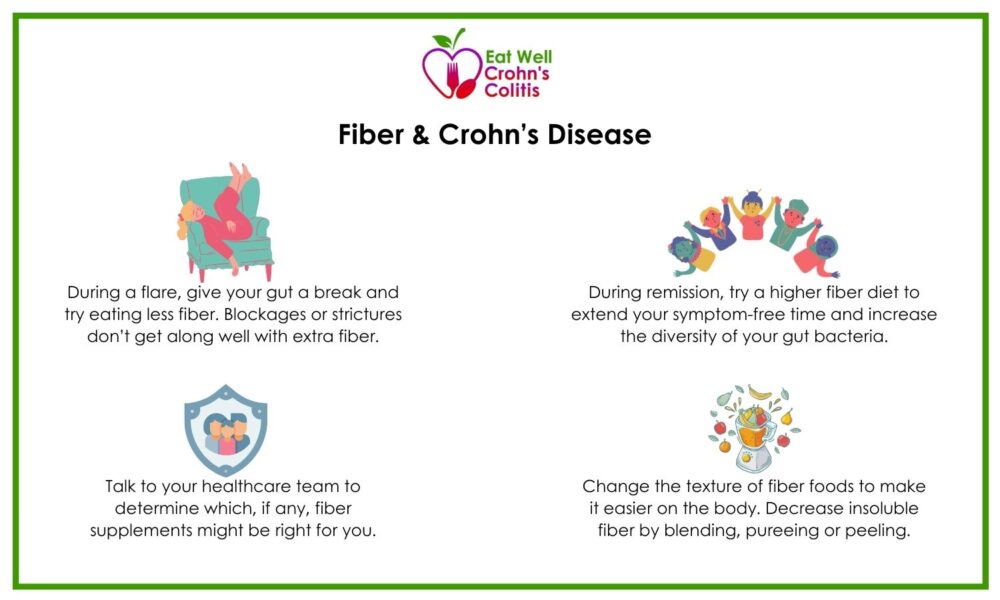
Are Fiber Supplements Good for Crohn’s Disease?
Precise Dosage Control
The studies mentioned above that highlight the benefits of fiber for Crohn’s disease were in reference to fiber from whole food sources like fruits, vegetables, beans, and whole grains. Fiber supplements can be useful to control the exact dosage of fiber, if needed.
Understanding Fructans-Based Fiber Supplements
Some research on fructans-based fiber supplements (15g/day) showed they can reduce the severity of Crohn’s by reducing inflammation and supporting healthy bacterial activity. Inulin is an example of a fructans-based fiber supplement. While inulin can be found naturally in foods like Jerusalem artichoke, chicory root, onion, and garlic, supplemental inulin is also available in capsule and powder forms.
Alternative Fiber Supplements
For those who do not tolerate Fructans-based fiber well, other common fiber supplements such as psyllium or oat bran may be considered by one’s healthcare team, but need more research is needed on how effective these supplements may be for Crohn’s disease.
Consulting Healthcare Professionals
Before starting any fiber supplement regimen, it’s important to talk to your IBD healthcare team and dietitian to identify the most suitable sources for your needs. Additionally, check that the supplements are free of any food additives, such as sugar alcohols, which may be harmful to those with IBD.
Take Home Message
There is still growing research to further understand the relationship between dietary fiber intake and Crohn’s disease. The recommended amount of fiber can change depending on whether you are experiencing a flare or are in remission. You can work with a Registered Dietitian to help figure out your fiber intake, manage symptoms and support your overall health.
Still Curious about Fiber and Crohn’s?
- Balance your meals with food sources of soluble fiber and insoluble fiber to support your Crohn’s journey. Check out a list of fiber food sources here!
- Find easy-to-digest recipes that blend, puree, or peel skins from fiber foods.
- Want to chat more about your specific situation? Get in touch and we can work together on this!
References
- Ellis, Esther MS,RDN,LDN. Fiber. eatright.org Web site. https://www.eatright.org/health/essential-nutrients/carbohydrates/fiber. Updated 2020. Accessed Jan 19, 2024.
- Ananthakrishnan AN, Khalili H, Konijeti GG, et al. A prospective study of long-term intake of dietary fiber and risk of Crohn’s disease and ulcerative colitis. Gastroenterology. 2013;145(5):970-977. doi:10.1053/j.gastro.2013.07.050
- Serrano Fernandez V, Seldas Palomino M, Laredo-Aguilera JA, Pozuelo-Carrascosa DP, Carmona-Torres JM. High-Fiber Diet and Crohn’s Disease: Systematic Review and Meta-Analysis. Nutrients. 2023; 15(14):3114. https://doi.org/10.3390/nu15143114
- USDA DGfA. Food sources of dietary fiber. https://www.dietaryguidelines.gov/ Web site. https://www.dietaryguidelines.gov/resources/2020-2025-dietary-guidelines-online-materials/food-sources-select-nutrients/food-0. Updated 2019. Accessed Jan 19, 2024.
- Christian BM. So, you want to increase your fiber intake? UMass Chan Medical School Web site. https://www.umassmed.edu/nutrition/blog/blog-posts/2022/3/so-you-want-to-increase-your-fiber-intake/. Updated 2022. Accessed Jan 19, 2024.
- Malinowski B, Wiciński M, Sokołowska M,M., Hill NA, Szambelan M. The Rundown of Dietary Supplements and Their Effects on Inflammatory Bowel Disease—A Review. Nutrients. 2020;12(5):1423. doi:https://doi.org/10.3390/nu12051423
- Kathryn Watson. Health Benefits of Inulin. Healthline. December 6, 2023. https://www.healthline.com/health/food-nutrition/top-inulin-benefits#inulin-supplements. Accessed January 22, 2024.
